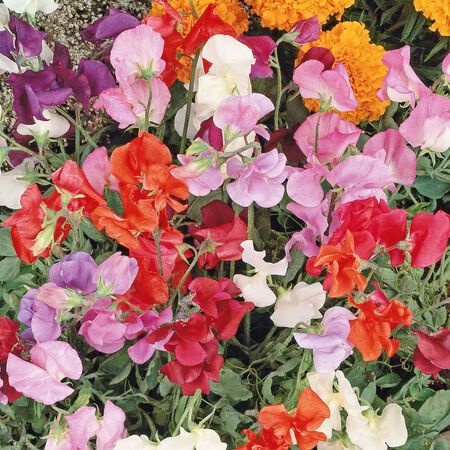Knee High, Sweet Pea Seeds
Key Attributes
Key Attributes
Product Details
Weight
.01Plant Height
5-6'Botanical Name
Lathyrus odoratusSeed Type
SeedAdditional Characteristics
Attracts Pollinators, Extended BloomsSeeds Per Gram
12Seeds Per Pound
5,400Packet
25 SeedsSow Depth
1/2"Seeds Per Ounce
338Breed
Open-pollinatedSun
Full SunGrowing Conditions
Container FriendlyUses
Cut FlowersLife Cycle
AnnualSow Method
Direct SowCategories
FlowersDays To Maturity (# Days)
60-70Seeds Per Acre
80 lbsComponents
Growing Instructions
![]() Learning Download: How to Grow Sweet Pea
Learning Download: How to Grow Sweet Pea
Sweet Peas are an old-fashioned flower that both experts and beginners chose for their gardens. They are a good starter flower when learning to grow flowers from seed because their seeds are large and usually they germinate easily.
Before Planting: Sweet Peas do well in cooler weather, and they can be planted outdoors as soon as the soil can be worked in the spring. The seed coating must be softened prior to planting, so soak the seeds overnight in water or use your fingernail to scratch the outer coating.
Planting: Dig a trellis before planting the seeds inside the trench, and plant them 10 inches apart and 1 inch deep. Provide a trellis of at least 6 feet for them to climb upon. Some Sweet Peas are true bush varieties, but most others are climbers.
Watering: Keep the soil moist.
Fertilizer: If soil isn’t enriched by manure or compost, fertilize with a half-strength liquid fertilizer twice during the Sweet Pea’s growing season.
Days to Maturity: Sweet Peas will begin to bloom by early to mid summer.
Harvesting: Sweet Peas are ready to cut for a bouquet when the lowest flowers on the stem are just beginning to blossom.
Tips: Vines may die in the summer heat. If a vine dies, remove it and plant something else.
Shipping Schedule
Our Seed Promise
 "Agriculture and seeds" provide the basis upon which our lives depend. We must protect this foundation as a safe and genetically stable source for future generations. For the benefit of all farmers, gardeners and consumers who want an alternative, we pledge that we do not knowingly buy or sell genetically engineered seeds or plants.
"Agriculture and seeds" provide the basis upon which our lives depend. We must protect this foundation as a safe and genetically stable source for future generations. For the benefit of all farmers, gardeners and consumers who want an alternative, we pledge that we do not knowingly buy or sell genetically engineered seeds or plants.
The mechanical transfer of genetic material outside of natural reproductive methods and between genera, families or kingdoms, poses great biological risks as well as economic, political, and cultural threats. We feel that genetically engineered varieties have been insufficiently tested prior to public release. More research and testing is necessary to further assess the potential risks of genetically engineered seeds. Further, we wish to support agricultural progress that leads to healthier soils, to genetically diverse agricultural ecosystems, and ultimately to healthy people and communities.
To learn more about the "Safe Seed Pledge" please visit www.councilforresponsiblegenetics.org.

